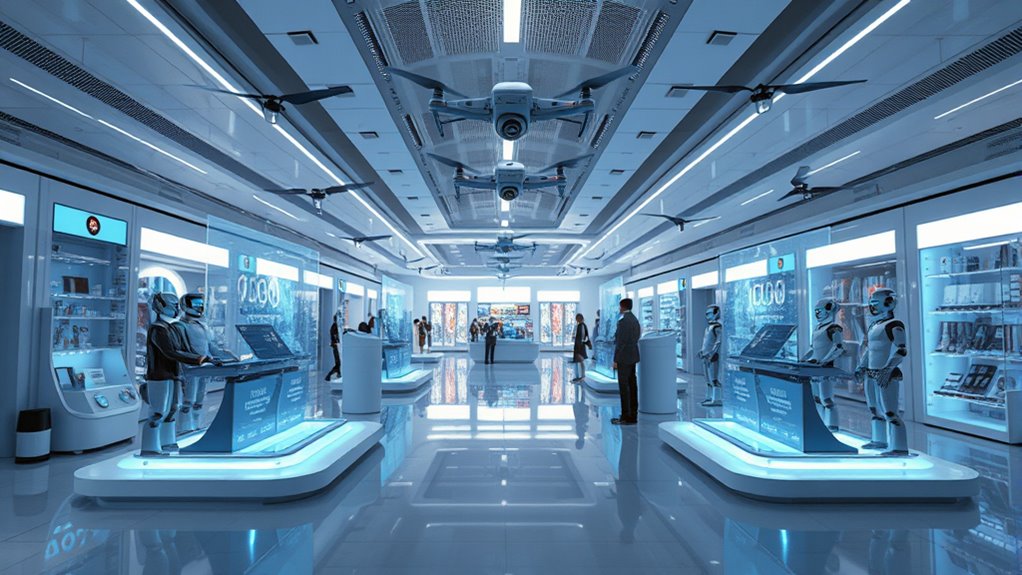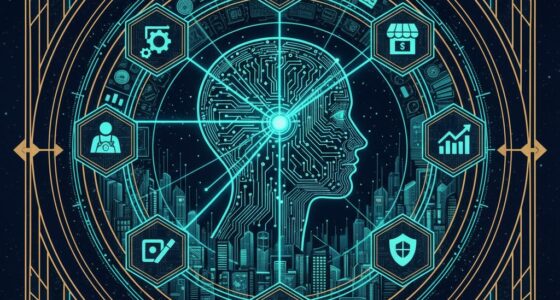The future of commerce will see humans gradually exit transactions as technology takes over. Automated systems, AI-driven personal shoppers, and virtual assistants will handle your shopping needs seamlessly and efficiently. With real-time personalization, instant checkout, and secure digital platforms, your interactions will become more autonomous and less dependent on human intervention. If you want to understand how these changes will impact your experiences and choices, there’s much more to explore ahead.
Key Takeaways
- AI-driven personalization and automation will handle most transactions, reducing the need for human involvement.
- Augmented reality and virtual assistants will enable fully immersive, self-guided shopping experiences.
- Blockchain and secure digital platforms will ensure seamless, trustless transactions without human oversight.
- Omnichannel and social shopping will become fully automated, integrating online, mobile, and social platforms seamlessly.
- Human roles will shift from transaction handlers to curators, strategists, and customer experience designers in the commerce ecosystem.

The future of commerce is rapidly transforming as technology, consumer expectations, and market dynamics evolve. You’re part of a global shift, where online shopping is projected to reach about $7.5 trillion by 2025, making up nearly a quarter of all retail sales worldwide. With over 2.77 billion people shopping online—roughly a third of the global population—you’re experiencing a marketplace that’s more accessible and personalized than ever before. China leads this revolution with 904.6 million online shoppers, followed by the U.S. with about 288 million. These numbers underscore how digital commerce has become ingrained in daily life, with 85% of consumers engaging in online shopping regularly.
Your expectations are changing, too. Fast delivery and convenience aren’t luxuries anymore—they’re standard. Economic uncertainties push you to be more value-conscious, researching products thoroughly before purchasing. It’s common for over 90% of consumers in major economies to buy from online-only retailers within a month. Grocery and food delivery services are also booming, with about 40% of consumers in countries like the U.S., UK, and Germany ordering groceries weekly online.
Technological innovations are powering this shift. Artificial Intelligence personalizes your shopping experience, tailoring product suggestions and prices based on your preferences. Virtual assistants and AI-driven comparison tools act as personal shoppers, streamlining your decision-making process. Augmented Reality lets you visualize products in your space before buying, reducing uncertainty. Blockchain technology enhances transaction security and transparency, building your confidence in digital payments. Meanwhile, 5G connectivity offers faster speeds and real-time insights, making your online interactions smoother and more responsive. Global eCommerce sales are projected to reach $7.5 trillion in 2025, demonstrating the vast scale of digital trade.
You’re also witnessing a move toward seamless omnichannel experiences. You switch effortlessly between online, mobile, and in-store shopping, expecting consistent service at every touchpoint. Marketplace platforms like Amazon and Alibaba expand their offerings, while niche sites cater to specific interests, giving you more curated options. Social shopping via livestreams and social media channels has become a significant way for you to discover and purchase products. The B2B space is evolving too, with digital procurement platforms delivering consumer-grade experiences, making transactions faster and more efficient. As a result, the human element is gradually fading, replaced by automated systems and intelligent agents that streamline the purchasing process and enhance your overall experience.
In this landscape, the human element is gradually fading. Automated systems, AI agents, and virtual assistants are handling tasks once performed by humans. As technology advances, you’ll find yourself increasingly interacting with intelligent systems designed to anticipate your needs, making the transaction process more seamless, personalized, and ultimately, more human-free.
Frequently Asked Questions
How Will Customer Service Evolve Without Human Interaction?
Customer service will become more efficient and personalized without humans, as AI handles most routine inquiries quickly and accurately. You’ll experience faster responses, proactive solutions, and tailored recommendations based on your preferences. Emotional intelligence tools will enable AI to address your concerns empathetically. While complex issues still need human oversight, you’ll notice a smoother, more proactive support system that anticipates your needs, making interactions seamless and satisfying.
What Are the Ethical Implications of Automated Transactions?
You face a world where automated transactions could release chaos or fairness, depending on how you handle ethics. Biases in AI could unfairly exclude or favor people, data breaches threaten privacy, and opaque algorithms erode trust. It’s up to you to guarantee transparency, compliance, and accountability. By actively managing these risks, you can shape a future where automation benefits everyone without compromising fairness or privacy.
How Will Small Businesses Adapt to Fully Automated Commerce?
You’ll adapt by embracing automation tools that streamline operations and enhance customer experiences. Invest in AI-driven platforms for personalized service and efficient workflows, while training your staff to manage new technologies. Focus on balancing automation with human touch where it matters, like customer support, to maintain loyalty. Stay informed about emerging trends and continuously optimize your processes, ensuring your business remains competitive and responsive in fully automated commerce environments.
Will AI Replace All Human Roles in Retail?
AI won’t replace all human roles in retail; instead, it acts like a gentle tide reshaping the shoreline. You’ll find that routine tasks become automated, freeing you to focus on soft skills like building relationships and understanding customer emotions. As AI handles data and logistics, your creativity and empathy will shine brighter. This ongoing transformation invites you to adapt, reskill, and embrace new opportunities, making retail a more dynamic and human-centric space.
How Secure Are Fully Automated Transaction Systems?
Fully automated transaction systems are increasingly secure thanks to advanced AI, real-time fraud detection, and robust cybersecurity measures. However, they still face significant threats like ransomware, supply chain vulnerabilities, and API exploits. You need to implement strong security practices, continuous monitoring, and regular updates to stay ahead of evolving cyber threats. While automation boosts security, it’s not foolproof, so ongoing vigilance remains essential to protect your systems effectively.
Conclusion
As you can see, the future of commerce is shifting toward seamless, human-free transactions. Remarkably, a recent study shows that 70% of consumers now prefer automated shopping experiences, valuing speed and convenience over traditional interactions. As technology continues to evolve, you’ll find yourself relying more on AI and automation, making transactions faster and more efficient. Embrace these changes—you’ll soon wonder how you ever bought anything without the power of the machines leading the way.









